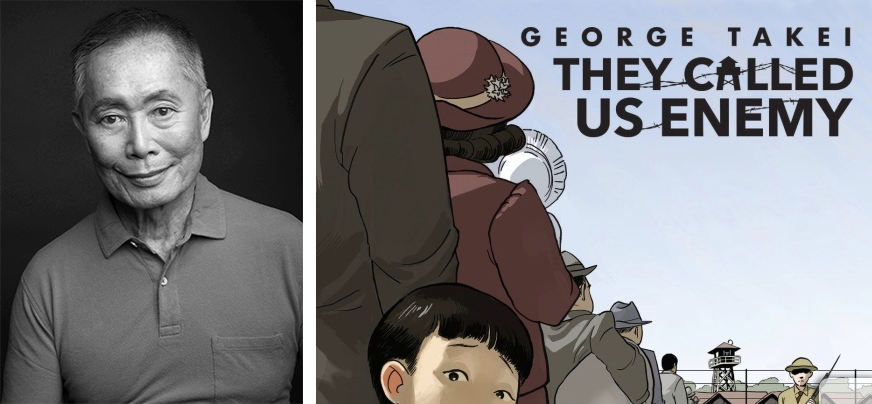 During a recent conversation with the Facing History community, acclaimed actor George Takei spoke about his experience surviving Japanese American incarceration and the lessons he subsequently learned from his father about the importance of relentless civic engagement. Takei is the author of the graphic memoir They Called Us Enemy (2019) in which he integrates his childhood experience of incarceration with perspectives gleaned from older survivors to offer readers of all ages an accessible window into his family’s experience.
During a recent conversation with the Facing History community, acclaimed actor George Takei spoke about his experience surviving Japanese American incarceration and the lessons he subsequently learned from his father about the importance of relentless civic engagement. Takei is the author of the graphic memoir They Called Us Enemy (2019) in which he integrates his childhood experience of incarceration with perspectives gleaned from older survivors to offer readers of all ages an accessible window into his family’s experience.
Below is an excerpt from Takei’s remarks that speaks to his family’s experience of incarceration during the war:
“When I was five years old, I was categorized as an enemy alien by my own country: the United States of America. But I wasn’t an enemy, I was a five-year-old kid. And I wasn’t an alien, I was an American born in Los Angeles to a mother who was born in Sacramento, California. My father was born in Japan but he was brought to San Francisco when he was a young boy, and he was reared and educated in San Francisco. And yet, because we looked like the people who bombed Pearl Harbor, we were seen as the enemy and as aliens.
There was war hysteria that swept across the country combined with racism…. [President Roosevelt] was swept up in the fear and hysteria and he signed Executive Order 9066 which ordered all Japanese Americans on the West Coast...to be rounded up and put in barbed-wire prison camps in ten of the most desolate places in the country. I remember that day. It was a terrifying day...
We saw two soldiers marching up our driveway carrying rifles with shiny bayonets on them and, with their fists, began pounding on the front door… My father answered the door and, literally at gunpoint, we were ordered out of our home… We were taken from our home to the horse stables of Santa Anita Horse Track, and we were assigned a smelly horse stall to live in while the camps were being built. And so that was the beginning of a chapter of American history that I lived through from the age of five until eight years old, the duration of the war...
Immediately after the bombing of Pearl Harbor, Japanese-American young people, like all young Americans, rushed to their recruitment centers to volunteer to serve in the U.S. Military. This was an act of patriotism which was answered with a slap on the face. They were denied military service and categorized as enemy aliens—and they were imprisoned. But a year into imprisonment, the government realized there was a wartime manpower shortage and there were all these young people that they could have had but had been categorized as enemy aliens. They wanted to draft us, but how to justify drafting enemy aliens out of a barbed-wire concentration camp to serve in the U.S. military? Their solution was as outrageous and as cruel as the imprisonment itself. It was a series of questions, but two questions turned all ten camps into turmoil...
My parents were being asked to...abandon their children and bear arms to defend the nation that was imprisoning their children. It was outrageous and...an ignorantly put together loyalty questionnaire. My parents answered “no”...and, because of that, they were categorized as disloyal…. [We were then sent to] a high-security camp called The Segregation Camp which had three layers of barbed-wire fences and a half a dozen tanks patrolling the perimeter to goad and to terrorize the people who were there…”
Takei later distilled how these experiences informed what he came to learn about democracy and civic engagement from his father:
“I learned about American democracy from someone who suffered the most, who felt the pain of the failure of democracy the most, but who firmly believed in the core ideals of our democracy. He said ‘ours is a people’s democracy and the strength of our people’s democracy makes it great. The weakness of this democracy is the fallibility of human beings and even great people, like Franklin Delano Roosevelt…’ And he told me about democracy—that it’s a participatory democracy. But I was a young teenager and would say ‘yeah but it was wrong, daddy. It was against our Constitution and against every ideal of our justice system.’ And so he said one Sunday afternoon, ‘let me show you how it’s got to work’...
We went to the Adlai Stevenson for President campaign headquarters. I knew about him from his speeches that I heard on the radio...and I knew about him from what my father told me but there I was with...young people, middle-age people, and old people committed to getting this man elected as President of the United States. And I understood...what a people’s democracy needs: we need to be actively participating. I owe my activism...to a very special man that I had as my father. He was the one who went through the most painful parts of the internment experience. But because he believes so firmly in the best ideals, the shining ideals of our democracy, he wanted to impart that to me… So I had my father’s good guidance and also got guidance from the people I worked with in the campaign. For me as a young, idealistic teenager, it was inspiring and it was fun. And so I became active in the political arena...
It’s so important that we understand that our democracy can be so fragile, as fragile as human fallibility. For the ideals to be alive, it requires our active participation. Young people, old people, and middle-age people that I saw at that campaign headquarters, all of us. And it’s going to be particularly important this year when we have a vitally important...election... There’s something more important than fear. We’ve got to rise above it.”
View George Takei’s conversation with Facing History here.
—
Facing History and Ourselves invites you to bear witness to Japanese American incarceration in your classroom using our array of relevant teaching resources.


